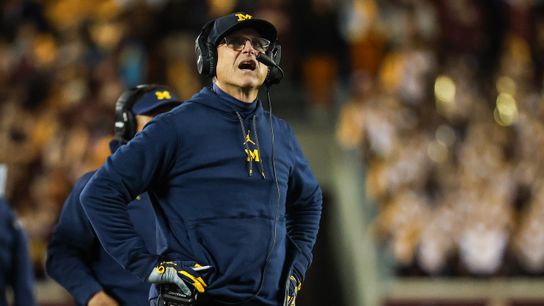Michigan hasn't committed to doing another season of Amazon's "All or Nothing" series, but cameras accompanied the Wolverines on their trip to France, so it's a definite possibility. Jim Harbaugh is sure of one thing, though: if a second season does happen, he'd like his players to be paid for it.
"We're exploring that right now Can we get $1,000 of stock in Amazon possibly for deferred compensation?" Harbaugh said at a fundraiser on Thursday, via ESPN. "... We're just kind of wondering if it's possible. We don't know if it is yet. We're just asking the question."
Harbaugh doesn't support turning his players into employees for tax reasons, but one question must be asked: if Michigan players deserve a cut in turning Michigan football into a product that Amazon markets to consumers, well, doesn't that same logic applies to the Big Ten's contracts with ESPN, CBS and FOX? The conference signed TV deals in 2016 with those three networks that pay the league $2.64 billion over six years. That's roughly $31 million per school, per year.
If Michigan players deserve a cut of one television contract, why not the other?
Harbaugh isn't the only person of power asking the question.
The real debate in college football isn't about turning athletes into employees and handing them W-2s on top of their scholarship papers, but about the merits of the amateur model and the Olympic model.
Hours before Harbaugh spoke to Michigan fans in Toledo, Penn State AD Sandy Barbour told PennLivethat the Olympic model was an idea worth considering. She isn't fully on board, but she isn't off board, either.
"It creates other questions," she said. "It doesn't mean it's not the right thing to do. And I do think it's a viable possibility, a viable alternative. But all the questions are out there that aren't answered."
And then there is the case of Condoleezza Rice. She isn't a coach or an AD but the former Secretary of State is the most respected voice in college sports who doesn't actually work in college sports. Rice was an original member of the College Football Playoff selection committee -- the only member with a career outside of college football -- and, with her term on the CFP committee expired, spent the spring leading a committee tasked with reforming college basketball. That group released its recommendations late last month, but on Wednesday she was the subject of a follow-up column in USA Today. While the Rice committee's recommendations were ultimately muddy, Rice could not have been more clear with USA Today columnist Christine Brennan. Brennan writes:
Two weeks after the Commission on College Basketball’s findings on the scandal-ridden men’s game were met with criticism in the news media, Commission chair Condoleezza Rice defended the group’s work in a telephone interview Wednesday while making a strong case that student-athletes in all NCAA sports should be able to make money from their names, images and likenesses.
“We believe that students ought to be able to benefit from name, image and likeness but you can’t decide a program until you know the legal parameters,” Rice told USA TODAY Sports. “That was the point. I think some of the commentary suggested that we didn’t really speak on this issue. I think we did speak on this issue, it’s just that we understand there’s a legal framework that has to be developed first.”
These are just three people -- three powerful people -- speaking independently of each other, offering similar thoughts on the same subject. None of them have the power to change anything on their own. But they are three voices in a growing movement.
The dam upholding the status quo in college sports has not burst, but it is starting to spring a few leaks. The real question is how long it holds.
